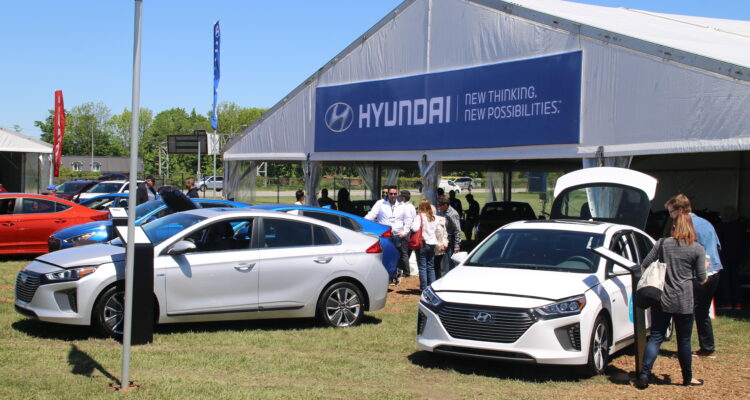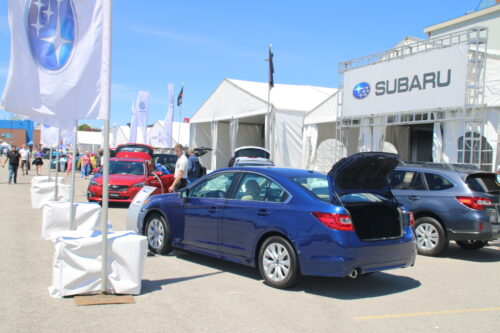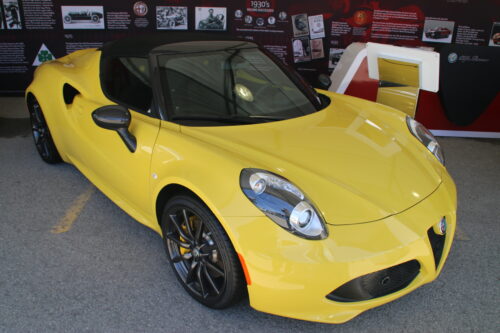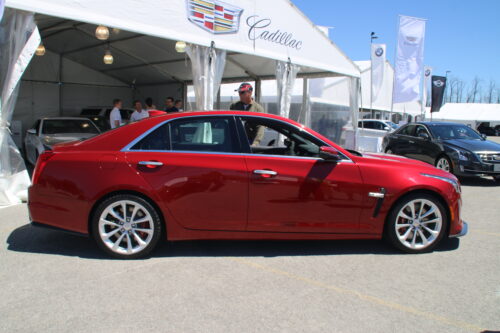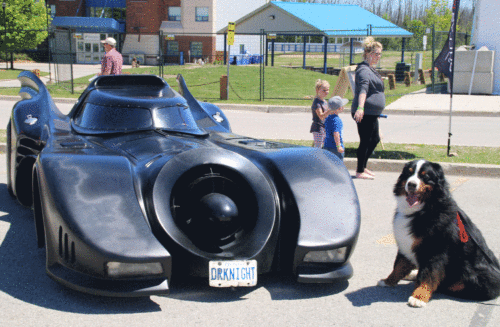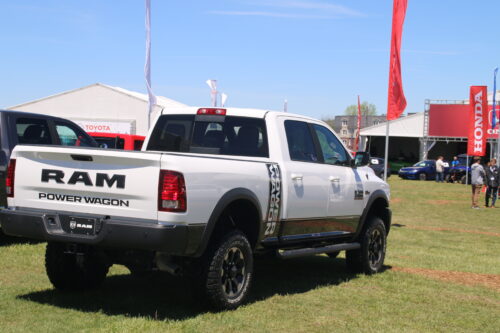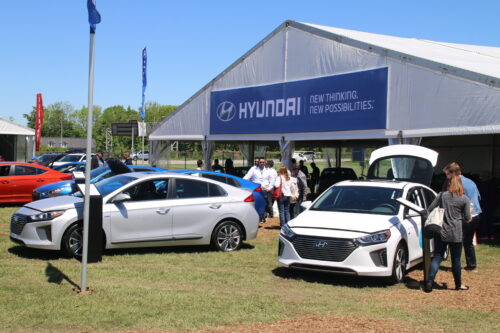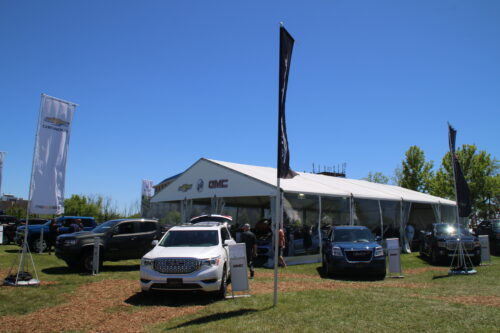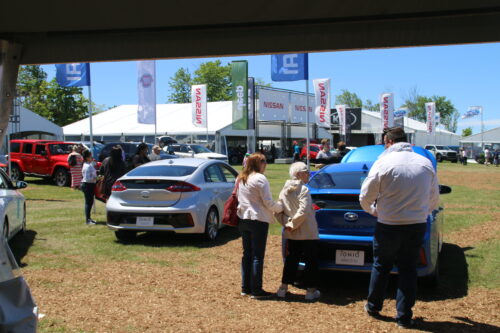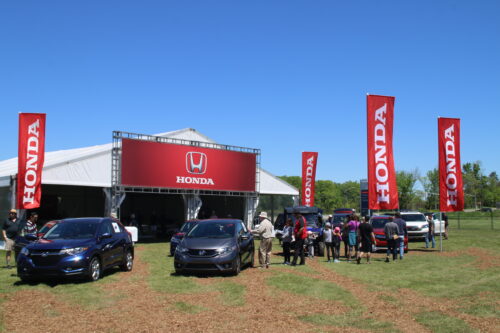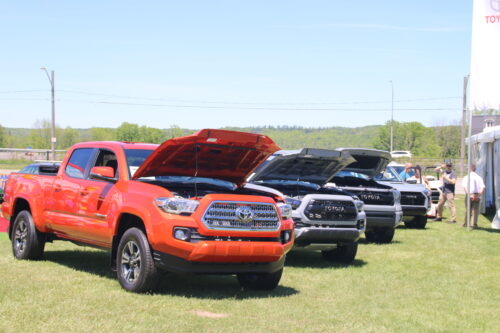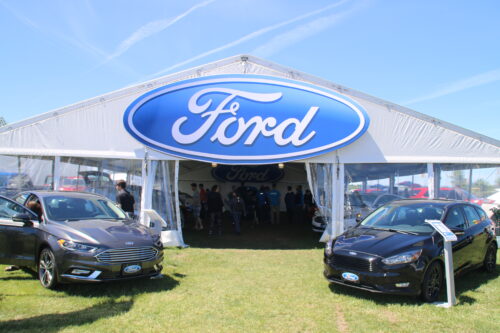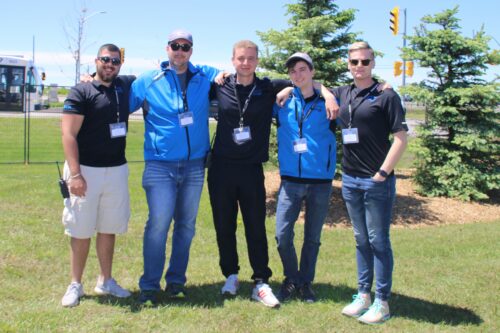To the vast majority of Canadians outside the automotive industry, the Automotive Business School of Canada, (ABSC) formerly known as the Canadian Automotive Institute (CAI) at Georgian College of Applied Arts and Technology in Barrie, Ontario, is a well-kept secret in the field of continuing adult education. But it’s the place to be if you’re serious about a future career in the ever-growing Canadian automotive sector.
Annually, for the last 31 years – 32 counting 2017, one of the first summer events of the season occurs on the grounds of Georgian College, Barrie Campus. Called the Georgian College Auto Show, it has the distinction of being the single largest outdoor, student-run auto show in North America.
Organized and run by students within the college’s Automotive Business School of Canada, (ABSC) this is an opportunity for the general public to attend a showcase of many of the latest vehicles–almost 200–brought to the event by 20 major automotive manufacturers in Canada. With slightly over 10,000 visitors experiencing a no-pressure, sales-free environment, a walk through the expansive area is devoid of tactics and ploys to either draw you closer–or even scare you off.
Far from it. This is an ABSC student-run show. There are no sales people. Each of the 20 participating manufacturers has ABSC students operate as informed, independent brand ambassadors. Their role is to enlighten guests–not sell. Students have attended OEM-driven product learning sessions in advance so they are as familiar as possible with every vehicle they represent. If a student brand ambassador does not have an answer to a specific question, they will make an effort to find out and will communicate the response after the fact. First and foremost, their principal function is not to sell; it’s to inform. The actual “selling” occurs off-site at a local dealer after the show packs up its tents.
So why did Canada’s only automotive school of business open in Barrie? The CAI was established in 1985 with the express purpose of preparing students to take on leadership roles in the automotive industry in Canada. The Toronto Automobile Dealers Association (TADA), the Canadian Automobile Dealers Association (CADA), and several other manufacturers, retailers, and aftermarket suppliers were instrumental in launching the school, but perhaps none played a more important part than the innovative faculty, including then Georgian College President, Wayne Busch and local dealer principal and businessman Jamie Massie.
In the beginning, only one program was offered: a three-year Business Administration and Automotive Marketing degree. The program focused on the retail side of the auto industry, with a specific emphasis on marketing. Graduates could comfortably step into entry-level positions in dealerships in the burgeoning aftermarket sector, and marketing companies also kept an eye on graduating classes with a view to bolstering their staff.
At one point, many prospective students believed that a career path in the automotive business really had only two possibilities: enrol at CAI and you’ll either get your start under the hood of a car or else learn to perfect the line, “Let me check with my manager on that.” But once they became a part of the unique CAI community, students soon came to learn of the exciting and diverse range of employment and career opportunities available.
With 32 shows in the rear view mirror, how did this annual show come about?
Back in 1985, Peter Hoysted, who was then the original program coordinator at the Canadian Automotive Institute, (CAI) had a conversation with Jamie Massie, dealer principal at Barrie’s Georgian Pontiac and a graduate of Northwood University in Michigan (then the only accredited auto-specific school of continuing education in North America), and then with Georgian College president, Wayne Busch. All three men, especially Hoysted, had a desire for something special at Georgian College. Hoysted wanted to showcase the young leaders of the future: his vision was that this show would be a stepping stone for students into jobs in the auto sector. It was important that the myth about unprofessionalism in the industry be dispelled. This forward-thinking trio wanted to mould the industry’s future, and they believed that this show was a great way of doing just that.
For three days in early June, 2017, 192 eager student volunteers worked each aspect of this sprawling event, interacting with the public in every role imaginable. Manning manufacturer tents; assisting with special attractions, including the Electric Vehicle Experience and the Pfaff Auto Track; selling tickets; acting as willing guides to consumers; and, running a live auction with a portion of the proceeds supplementing scholarships for students attending ABSC.

Suffice to say, an event of this scope does not happen overnight. Planning for this show begins almost as the last transport leaves the site returning autos to their respective local dealers. A post-mortem is prepared, discussed and annotated for future student committees. Once October comes around, plans and arrangements for the following June begin in earnest and five students from ABSC are brought in as members of the overall organizing committee. Each of these five full-time students assumes a role–as if they were working in a company involved in the planning and presentation of a comprehensive three-day event with multiple moving parts. For 2017, those members were Daniel Montesanti (Marketing and Media Relations), Alex Jursa (Customer Experience), Bogdan Tofan-Petre (Logistics and Site), Jason Westelaken (Sponsorship) and, Jonathan Smeenk (Student Experience).
Bear in mind, each of these five individuals is also carrying a full course load in addition to performing their individual assignments. While these students are compensated for all the work they do for this huge event: there is a clear understanding that their involvement cannot have any adverse effects on their gaining either their diploma or degree. They are expected to perform their duties individually–and also as a team.
While holding one of these five positions looks great on a resume, there are no safety nets–just like the real world. They willingly assume the responsibility and accountability which comes with the position.
In a general discussion with this young group of future auto executives, it was apparent they all made a point of working together. As Daniel Montesanti stated “It’s about working together, as a team. This committee checked their egos at the door. From the very early days, it was obvious this was going to succeed as a collaborative effort.”
For 2017 the theme determined by the students for the show was “Experience Innovation”–reflecting the ever-changing, evolving automotive industry juxtaposed against the forward-thinking ABSC.
Some of the shows highlights included the popular Pfaff Auto Track. Willing participants buy a ticket to ride shotgun in a powerful sports performance car, while an experienced driver launches one of two alternating Porsches through and around a pylon-marked course.
Another popular and timely exhibit was the Electric Vehicle Experience. In an area separate from the actual show, Georgian has a couple of vehicle charging stations. Here was a cross section battery electric vehicles (BEV), plug in hybrids (PHEVs) and extended range EVs with back up gasoline-fueled internal combustion engines. Consumers had an opportunity to take a spin behind the wheel with a brand ambassador who could explain the basics on how the vehicle they had elected to drive, performed.
The ABSC automotive business programs and the annual auto show are unique. Faculty members strive to provide all students with the benefit of their industry experience and many invaluable future contacts. There is passion and enthusiasm, and not just for cars, spreadsheets, and cam shafts: people share, and people give—students and instructors alike. ABSC provides significant opportunities to its students, and it can boast an over 90% graduate employment rate. Such success is directly attributable to two things: the quality and relevance of the education; and, the fact that graduates will have already achieved one full year of automotive-related work experience through three paid co-op work terms.
Chances are these days when you talk with a manufacturer’s representative or an individual in an automotive-related retail service establishment, they worked the auto show at Georgian College while attending the Automotive Business School of Canada.
Related links:
Automotive Business School of Canada



